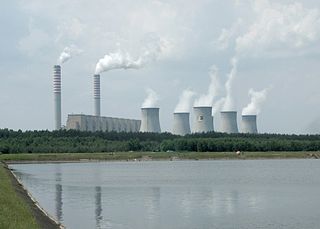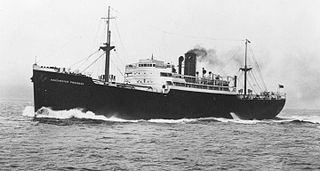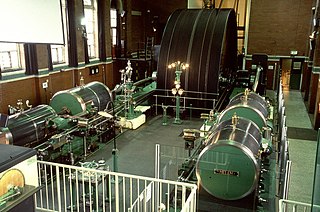Kerosene, paraffin, or lamp oil is a combustible hydrocarbon liquid which is derived from petroleum. It is widely used as a fuel in aviation as well as households. Its name derives from Greek: κηρός (keros) meaning "wax", and was registered as a trademark by Canadian geologist and inventor Abraham Gesner in 1854 before evolving into a generic trademark. It is sometimes spelled kerosine in scientific and industrial usage. The term kerosene is common in much of Argentina, Australia, Canada, India, New Zealand, Nigeria, and the United States, while the term paraffin is used in Chile, eastern Africa, South Africa, Norway, and in the United Kingdom. The term lamp oil, or the equivalent in the local languages, is common in the majority of Asia and the Southeastern United States. Liquid paraffin is a more viscous and highly refined product which is used as a laxative. Paraffin wax is a waxy solid extracted from petroleum.

Anthracite, also known as hard coal, black coal, etc. is a hard, compact variety of coal that has a submetallic luster. It has the highest carbon content, the fewest impurities, and the highest energy density of all types of coal and is the highest ranking of coals.

Emergency! is an American television series that combines the medical drama and action-adventure genres. It was a joint production of Mark VII Limited and Universal Television. It debuted on NBC as a midseason replacement on January 15, 1972, replacing the two short-lived situation comedy series The Partners and The Good Life, and ran for a total of 122 episodes until May 28, 1977, with six additional two-hour television films during the next two years, 1978 and 1979.

A tender or coal-car is a special rail vehicle hauled by a steam locomotive containing its fuel and water. Steam locomotives consume large quantities of water compared to the quantity of fuel, so their tenders are necessary to keep them running over long distances. A locomotive that pulls a tender is called a tender locomotive. Locomotives that do not have tenders and carry all their fuel and water on board the locomotive itself are called tank locomotives.

Roast chicken is chicken prepared as food by roasting whether in a home kitchen, over a fire, or with a rotisserie. Generally, the chicken is roasted with its own fat and juices by circulating the meat during roasting, and therefore, are usually cooked exposed to fire or heat with some type of rotary grill so that the circulation of these fats and juices is as efficient as possible. Roast chicken is a dish that appears in a wide variety of cuisines worldwide.

A fossil fuel power station is a thermal power station which burns a fossil fuel, such as coal or natural gas, to produce electricity. Fossil fuel power stations have machinery to convert the heat energy of combustion into mechanical energy, which then operates an electrical generator. The prime mover may be a steam turbine, a gas turbine or, in small plants, a reciprocating gas engine. All plants use the energy extracted from expanding gas, either steam or combustion gases. Although different energy conversion methods exist, all thermal power station conversion methods have efficiency limited by the Carnot efficiency and therefore produce waste heat.

A fireman, stoker or watertender is a person whose occupation it is to tend the fire for the running of a boiler, heating a building, or powering a steam engine. Much of the job is hard physical labor, such as shoveling fuel, typically coal, into the boiler's firebox. On steam locomotives the title fireman is usually used, while on steamships and stationary steam engines, such as those driving saw mills, the title is usually stoker. The German word Heizer is equivalent and in Dutch the word stoker is mostly used too. The United States Navy referred to them as watertenders.

RMS Adriatic was a British ocean liner of the White Star Line. She was the fourth of a quartet of ships of more than 20,000 GRT, dubbed The Big Four. The ship was the only one of the four which was never the world's largest ship. However, she was the largest, the fastest, and the most luxurious of the Big Four, being the first ocean liner to have an indoor swimming pool and a Turkish bath.

HMS Spiteful was a Spiteful-class torpedo boat destroyer built at Jarrow, England, by Palmers Shipbuilding and Iron Company for the Royal Navy and launched in 1899. Specified to be able to steam at 30 knots, she spent her entire career serving in the seas around the British Isles.

The crew of the RMS Titanic were among the estimated 2,208 people who sailed on the maiden voyage of the second of the White Star Line's Olympic class ocean sea liners, from Southampton, England to New York City in the United States. Halfway through the voyage, the ship struck an iceberg and sank in the early morning of 15 April 1912, resulting in the deaths of over 1,500 people, including approximately 688 crew members.

A mechanical stoker is a mechanical system that feeds solid fuel like coal, coke or anthracite into the furnace of a steam boiler. They are common on steam locomotives after 1900 and are also used on ships and power stations. Known now as a spreader stoker they remain in use today especially in furnaces fueled by wood pellets or refuse.

Manchester Liners was a cargo and passenger shipping company founded in 1898, based in Manchester, England. The line pioneered the regular passage of ocean-going vessels along the Manchester Ship Canal. Its main sphere of operation was the transatlantic shipping trade, but the company also operated services to the Mediterranean. All of the line's vessels were registered in the Port of Manchester, and many were lost to enemy action during the First and Second World Wars.

Exeter Power Station is a former coal-fired power station on the River Exe quayside, Exeter, England.

J & E Wood was a company that manufactured stationary steam engines. It was based in the Bolton in Greater Manchester, England. The company produced large steam-driven engines for textile mills in Lancashire and elsewhere.
Ocker Hill Power Station was situated at Ocker Hill in Tipton, Staffordshire, at a point where the Walsall Canal intersected the L&NWR Wednesbury to Princes End railway line. It was opened in 1902 by the Midland Electric Corporation for Power Distribution Ltd.(MEC) and supplied electricity at 7 kV two phase 50 Hz to much of the Black Country. At the time of its building it was stated by the Stourbridge County Express that it was planned to be the largest power station in England. Although this may have been the original intention, it was never achieved.
The South African Railways Class MG 2-6-6-2 of 1911 was a steam locomotive from the pre-Union era in Transvaal.

On a ship, the fire room, or FR or boiler room or stokehold, referred to the space, or spaces, of a vessel where water was brought to a boil. The steam was then transmitted to a separate engine room, often located immediately aft, where it was utilized to power the vessel. To increase the safety and damage survivability of a vessel, the machinery necessary for operations may be segregated into various spaces, the fire room was one of these spaces, and was among the largest physical compartment of the machinery space. On some ships, the space comprised more than one fire room, such as forward and aft, or port or starboard fire rooms, or may be simply numbered. Each room was connected to a flue, exhausting into a stack ventilating smoke.

The Racecourse Colliery is an exhibit located at the Black Country Living Museum

The South African type FT tender was a steam locomotive tender.

Frederick William Barrett was a British stoker. After having served as a stoker on several ships, on 6 April 1912, he was hired on board the RMS Titanic as lead stoker. On April 15, 1912, while the ship was sinking, Barrett boarded lifeboat No. 13 and took command of it, thus surviving the disaster. He later testified before commissions of inquiry into the sinking of the ship and continued to work in the navy until the 1920s. In 1923, after losing his wife Mary Anne Jones, he remained in Liverpool and worked ashore as a logger.


















